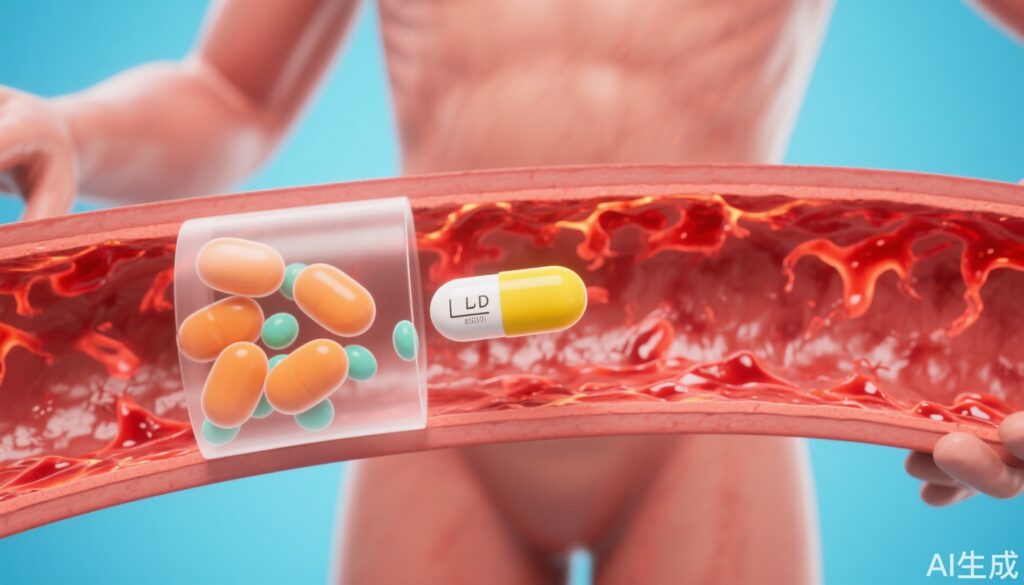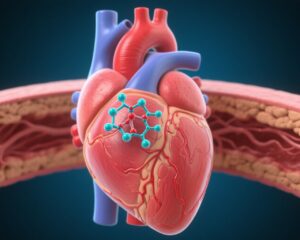Highlight
- Evolocumab reduces LDL cholesterol by approximately 60% consistently in patients with or without autoimmune/inflammatory diseases (AIID).
- Patients with AIID exhibit higher baseline inflammation (hsCRP) but evolocumab does not significantly affect hsCRP levels.
- Relative risk reduction of major cardiovascular events with evolocumab is greater in AIID patients (~42% reduction) compared to those without AIID (~14% reduction).
- Key secondary outcomes including cardiovascular death, myocardial infarction, and stroke are significantly reduced more in the AIID subgroup using evolocumab.
Study Background and Disease Burden
Cardiovascular disease (CVD) remains a leading cause of morbidity and mortality worldwide. Patients with autoimmune or inflammatory diseases (AIID), such as rheumatoid arthritis and psoriasis, face a heightened risk for atherosclerotic cardiovascular events due to chronic systemic inflammation, which accelerates vascular damage and plaque formation. Despite statin therapy being the mainstay for LDL cholesterol reduction, patients with AIID may not achieve optimal cardiovascular risk reduction. Contemporary therapeutic strategies to intensively lower LDL cholesterol might therefore offer additional benefit.
Proprotein convertase subtilisin/kexin type 9 (PCSK9) inhibitors, like evolocumab, have emerged as potent LDL cholesterol-lowering agents. The FOURIER trial evaluated evolocumab’s efficacy and safety in reducing cardiovascular events in a large population with established atherosclerotic cardiovascular disease (ASCVD). This particular analysis focuses on the trial’s AIID patient subset and compares outcomes versus those without AIID.
Study Design
FOURIER was a randomized, double-blind, placebo-controlled trial enrolling 27,564 patients with stable atherosclerosis already receiving statin therapy. Participants were randomized to evolocumab or placebo with a median follow-up of approximately 2.2 years. AIID was defined broadly to include any autoimmune or chronic inflammatory conditions, with rheumatoid arthritis and psoriasis being the most common.
The primary endpoint was a composite of cardiovascular death, myocardial infarction, stroke, unstable angina, or coronary revascularization. A key secondary endpoint focused on cardiovascular death, myocardial infarction, or stroke. Baseline and treatment effects on LDL cholesterol and high-sensitivity C-reactive protein (hsCRP), a marker of inflammation, were also assessed.
Key Findings
Among all participants, 889 (3.2%) had an AIID at baseline. These patients had a slightly lower median LDL cholesterol (90.0 mg/dL) than those without AIID (91.5 mg/dL), but the difference was statistically significant (P=0.025). Evolution with evolocumab therapy led to an approximate 60% reduction in LDL cholesterol, consistent across both groups (60.2% in AIID vs. 59.0% in non-AIID; P=0.57).
Baseline hsCRP was elevated in the AIID group (median 2.1 mg/L) compared to the non-AIID group (1.7 mg/L) reflecting chronic inflammation (P<0.001). However, evolocumab did not significantly alter hsCRP levels in either group.
Regarding clinical outcomes, evolocumab decreased the risk of the primary composite endpoint by 42% in those with AIID (hazard ratio [HR] 0.58; 95% confidence interval [CI], 0.38-0.89) compared to a 14% reduction in those without AIID (HR 0.86; 95% CI, 0.80-0.93; Pinteraction=0.066). Similarly, the risk of cardiovascular death, myocardial infarction, or stroke was reduced by 58% in the AIID group (HR 0.42; 95% CI, 0.24-0.74) versus 19% in the non-AIID group (HR 0.81; 95% CI, 0.74-0.89; Pinteraction=0.022).
These findings suggest a greater relative cardiovascular benefit of intensive LDL cholesterol lowering in patients with AIID. The mechanism likely relates to heightened cardiovascular risk driven by systemic inflammation, which amplifies the benefits of LDL reduction. Still, the unchanged hsCRP indicates that evolocumab's benefits predominantly stem from lipid modulation rather than direct anti-inflammatory effects.
Safety data from the FOURIER trial showed evolocumab to be well tolerated with no significant difference in adverse events between AIID and non-AIID populations.
Expert Commentary
The heightened cardiovascular risk in patients with AIID is well recognized, and the FOURIER subgroup analysis robustly demonstrates that intensive LDL cholesterol lowering with evolocumab confers substantial relative risk reductions beyond statin therapy alone. This is particularly relevant because standard lipid lowering has limited effects on the inflammatory milieu prevalent in AIID. Although evolocumab does not reduce hsCRP, the data support aggressive lipid management as a key strategy to mitigate cardiovascular risk in this vulnerable patient population.
Limitations include the relatively small number of AIID patients and potential heterogeneity in types and severity of autoimmune conditions. Future studies should explore if certain AIID phenotypes derive even greater benefit or if combined anti-inflammatory and lipid-lowering strategies yield additive effects.
Conclusion
This analysis of the FOURIER trial establishes that intensive LDL cholesterol lowering with evolocumab significantly reduces cardiovascular events in patients with autoimmune or inflammatory diseases, with benefits exceeding those observed in patients without AIID. While evolocumab does not affect markers of systemic inflammation such as hsCRP, its lipid-lowering effect translates into a pronounced reduction in cardiovascular mortality and morbidity. These data recommend consideration of PCSK9 inhibitor therapy in high-risk AIID patients alongside current statin treatment to optimize cardiovascular outcomes.
References
1. Zimerman A, Kunzler ALF, Weber BN, et al. Intensive Lowering of LDL Cholesterol Levels With Evolocumab in Autoimmune or Inflammatory Diseases: An Analysis of the FOURIER Trial. Circulation. 2025;151(20):1467-1476. doi:10.1161/CIRCULATIONAHA.124.072756
2. Bonaca MP, Nault P, Giugliano RP, et al. Low-Density Lipoprotein Cholesterol Lowering With Evolocumab and Outcomes in Patients With Peripheral Artery Disease: Insights From the FOURIER Trial. Circulation. 2018;137(4):338-350. doi:10.1161/CIRCULATIONAHA.117.032235
3. Libby P, Ridker PM, Hansson GK. Inflammation in atherosclerosis: from pathophysiology to practice. J Am Coll Cardiol. 2009;54(23):2129-2138. doi:10.1016/j.jacc.2009.09.009
4. Marder W, Littlefield BS. Cardiovascular disease in autoimmune diseases. Curr Opin Rheumatol. 2013;25(5):495-502. doi:10.1097/BOR.0b013e328363c38a


